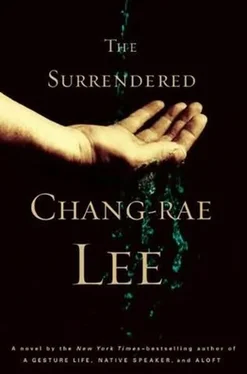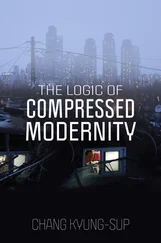“You do,” she told him.
“Then you can stay.”
“I want to, yes. But if I did, what would happen? Do you think anything good would come of it? Do you think we could work together like simple colleagues?”
“You mean like you are with your husband?”
“Please don’t be like that. Don’t act like a boy.”
“Isn’t that what you want?”
“Please stop.”
“Isn’t that why we were together? Because you wanted someone you didn’t have to be righteous and responsible with, and who gave you a good screw besides?”
“Fuck you.”
She turned to leave but he caught her by the wrist and pulled her in and tried to kiss her and she turned away, covering her face. He persisted and she slapped him. But he held on to her anyway, not even flinching when she raised her hand again. She tried to wrench away, but his grip on her was fierce, unbreakable, as though she were manacled to a rock wall.
“You’ve taken pity on all of us, haven’t you?” he said, tugging her closer. “I’m talking to you now! I want you to listen to me now! Before you came this place was no better or worse than any other orphanage in this damned country. Which was just fine for the kids and the aunties, and even for me. There’s enough food and a roof and no more killing, and so what else is there to want? But you’re leaving, and what do we have now? You know what I found one of your girls doing after your husband announced you were leaving?”
“Just let me go-”
“It was Mee-Sun. She was at the well pump, drinking water straight from it like she was dying of thirst. I passed her twice before I noticed she wasn’t stopping. She was just drinking and drinking, getting her sweater soaked, and I had to pull her off it. I thought she was going to drown herself. I asked her what the hell she was doing, and she said she felt funny inside, because you weren’t going to be here anymore. For some reason she felt like she was hungry again. She said she used to do it during the war, so she wouldn’t feel so empty inside.”
“What would you have me do? Don’t you think I want to take every one of them?”
“Then take them!” he said, grabbing her other wrist. She resisted him and he pushed her against the shed wall with enough force that for a moment she thought he might hurt her. And if he did she wouldn’t care. She wouldn’t fight. “Did you think you could come and go so easily? Is this what happens in that precious book of yours? I want to know. I thought it was about showing mercy to the helpless, to the innocent. But I think that book of yours is worthless. In fact, it’s worse than that. It’s a lie. It’s changed nothing and never will. That battle he describes, when did that happen?”
“A long time ago.”
“How long?”
“Almost a hundred years.”
“A hundred years! How many people got slaughtered in that time? Got ground up to nothing? How many went up in smoke? I’m not even counting us leftovers. But you, you do your part, don’t you? You offer us hope and goodness and love. You’re indispensable. But no one can help you. Isn’t that right?”
“No.”
“So you have to help yourself. Finally I know why. I’ve figured it out. Because you know in your heart that once you’ve come here you can’t give up anyone. Because when you do, you leave every last one of us.”
He let go of her then but she held on to him, afraid all at once of his absence, of being left alone, and though she turned her face away, he pulled off her knit cap and tightly clasped her hair and kissed her roughly on the face. Then he kissed her mouth and she turned but he held himself against her and when her own mouth softened all of his fury seemed to find her, his hands running over her as if she were difficult clay and he was desperate to remake her. But there was no need. She pulled him against her on the wall and she kept her mouth on his while his hand pressed her from beneath, rocking her, anchoring her on its hard seat, and after the days of unwinding wretchedness her body came wholly awake, alive. She didn’t wish it but it was true. She was cured.
THE HUNGER. It had come for June again. Yet this time, unlike on the road, when she was marching with her mother and her siblings and with the twins and then finally alone, it was not a lurking angel of oblivion. An angel of death. None of them had succumbed to hunger itself but it had driven them to exhaustion and carelessness and ultimately to peril and she always believed it would do thusly to her. Push her to the precipice. But this time, she wasn’t hiding or running from it; she was inviting it along in a kind of dance, as a partner, a companion that would mark her every move. She knew that hunger would clarify her mind, strip away all extraneous thought, and leave her with the focus of pure, unswerving will.
She was eating almost nothing. The first couple of days were difficult; she could not have a thought that didn’t involve breaking off from whatever she was doing and sprinting to the kitchen where the aunties were stirring the pots and push them aside and plunge her hand into the large cast-iron vat of rice porridge as if she were a bear reaching into a beehive. Fill herself to bursting. But after the second full day the panicked tremors began to subside, and on the third and fourth diminished enough that the chasm inside her was not of any need unrequited, nor a body forlorn, but a version of herself that she did not know until now existed, this June in quiet thrall. It wasn’t an emptiness at all. It was the truer sculpture of her, the more deeply worked shape, and rather than feel her strength drawn down she was girded as she went forth about the orphanage, the ground hardly apparent beneath her feet.
Yesterday one of the aunties had regarded her suspiciously and kept glancing her way after she took her bowl of rice mixed with soup. After that, June made sure to eat a couple of bites whenever the old woman was looking her way but then would quickly spoon her food into the bowl of whoever was beside her (she made sure now not to sit off by herself), some younger boy or her mouthy bunkmate So-Hyun, who made no fuss or complaints about getting an extra helping, even though there was plenty of food. Orphans never declined.
Otherwise she was still mostly avoided or ignored, which suited her. She was no longer doing chores at the Tanners’ cottage-an auntie had informed her that she should not go there anymore-and as no other job was assigned to her she could simply slip off after classes and meals where attendance was noted and wander in the hills. The foliage of the bushes and young trees had mostly fallen to the ground so that she was wading through puddles of brilliant color. She would have liked to pick up the pretty little leaves or even lie down in a pile of them but the strange thing was that she had to keep moving, for when she kept still she grew dizzy, this wild ball of a storm twisting within her like a gyroscope. She gagged if she stopped for too long. So she took to running, running fast in her too-tight shoes, the raw throbs of the blisters marking the distance on the deer trails that the boys and Hector used in their forays to gather firewood. With each step the grating pains flashed up into her chest and throat but she didn’t whimper or even grimace and she swallowed them as if they were sweet sustenance.
The other day, after English class, Sylvie had offered a wave and a smile and though June was desperate to rush forward and press her face into the woman’s chest she knew Reverend Tanner might see them. And even if he couldn’t, she would show Sylvie her resolve. So instead she just nodded and scurried away. Since rousing Reverend Tanner out of bed a week earlier she had not spoken to Sylvie at all. Not a word. She knew earlier had been wrong to be so stubborn that morning and she would do what she could to get back into his graces enough so that he’d let his wife adopt her, and if that meant denying herself and Sylvie for a brief time, then so be it. June had faith: if he loved his wife, he would yield. She had never known anything like faith before but she was quite certain she knew what it was now, at least the bodily expression of it, the privation in her belly paradoxically convincing her of her way.
Читать дальше











